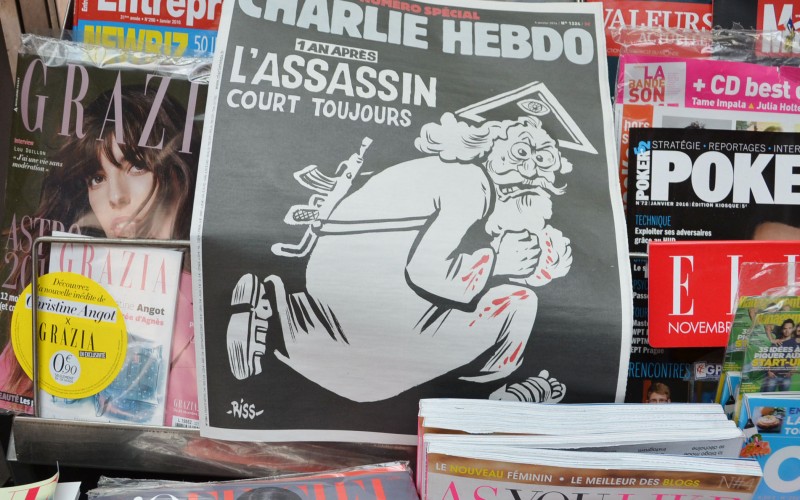Conflating Christianity and Islam is an absurd response to terrorist atrocities
The first anniversary of the Charlie Hebdo and kosher supermarket attacks in Paris has thrown up some commentary that has generated more heat than light.
Jan 12, 2016

Fr Alexander Lucie-Smith
The first anniversary of the Charlie Hebdo and kosher supermarket attacks in Paris has thrown up some commentary that has generated more heat than light. Charlie Hebdo itself announced that “A year on, the murderer is still out there,” illustrating this with a picture of a figure supposed to represent God.
L’Osservatore Romano rose to the occasion to point out that the nexus between religion and violence is not so easy or so simple; and now we have this article from Nick Cohen over at the Guardian website.
There are several points that Mr Cohen makes that require some sort of a reply.
First of all, Mr Cohen has a go at the Pope:
Personally, I have no defence to offer of the Papal words on this matter. Back in the 1980s I used to hang out with, not by choice, quite a lot of people who were under the influence of Jesuit Latin American theology. Victim blaming was one of their favourite occupations, and it was regularly applied to the situation in Northern Ireland. Britain was being bombed, but what could it expect given its behaviour in Northern Ireland? I didn’t like that argument then, and I don’t like it any more now. My instinct, and it is the right one I feel, is always to blame the perpetrators.
But then Mr Cohen goes further. He tells us that “cultural conservatives do not want to be reminded that there is no Islamist crime so great the Judaeo-Christian tradition did not once authorise it” and goes on to tell us that shocking things that happen in the territory controlled by Daesh all have their parallel in the Bible or in Christian history.
Now, it is perfectly true that sodomy was a capital offence in Elizabethan England, just as it is in Daesh today. It is also true that the Book of Leviticus authorises stoning for adultery, a punishment still in force in Daesh.
But all this overlooks one important fact. Nowhere on earth today is there a Catholic who upholds the death penalty for sexual sin. Yes, there once was an Inquisition (a deeply misunderstood and maligned body) but those days are gone. The Church of today is nothing like Daesh. Which leads to an interesting question that Mr Cohen raises but fails to engage with: how come Christianity is as it is today and Islam is so very different?
Mr Cohen says: “Civilisation came from the battering that religion took from the Enlightenment, from sceptics, scientists, mockers and philosophers, who destroyed their myths and exposed the immorality of their taboos.” Actually, that is rhetoric, not history. Centuries before the Enlightenment, St Thomas Aquinas did not lay out the justification for freedom of conscience, and the freedom of even a mistaken conscience, because anyone battered or bullied him into it. Rather he did it based on his reflections on scripture and the tradition of the Church, as exemplified by St Augustine. And civilization predated the Enlightenment by many centuries, one need hardly add.
Mr Cohen’s chief mistake is to swallow the common myth that sees history divided into two distinct epochs, an age of ignorance and an age of enlightenment, with a great figure who marks the transition from one to another. For Muslims, it is Mohammed; for Professor Dawkins, it is Darwin, and for Mr Cohen, it is Kant. But this is not a mistake any Christian would make.
It was this attitude that Alexander Pope was surely mocking when he wrote the ironic couplet:
Nature and Nature’s laws lay hid in night.
God said “Let Newton be!” and all was light.
This brings us back to the fact that L’Osservatore Romano is right to protest when Charlie Hebdo blames God for the carnage of last year. The religious realm is rather more nuanced than either Charlie Hebdo or Mr Cohen thinks. It seems rather trite to point this out, but it really has to be said: when someone in the Catholic Church uses the word ‘God’, and when the Charlie Hebdo killers used the word usually translated as ‘God’, the two words, though sounding the same, are not standing for the same concept.
Again, Catholics and Muslims have two very different understandings of divine revelation; to describe both Catholics and Muslims as ‘people of the book’ may be superficially true, but is deeply unhelpful, because their book is understood in a totally different way to ours. But this sort of reasoning – namely the realisation that certain resemblances can co-exist with deep difference and that certain terms are not univocal but equivocal – which is a legacy of the Enlightenment, which he professes to admire, seems to have passed Mr Cohen by.--Catholic Herald







Total Comments:0